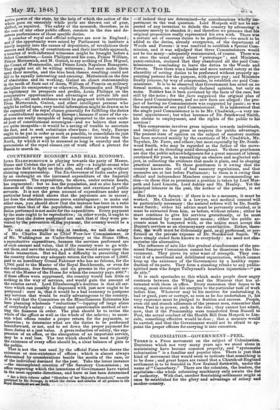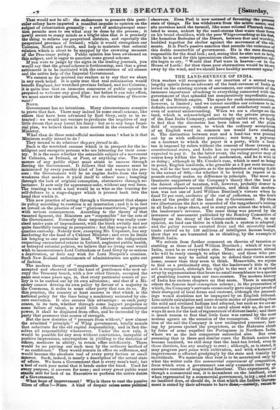COLONIZATION—GOVERN ME NT—PEEL.
THERE is a Press movement on the subject of Colonization. Doctrines which not very many years ago we stood alone in maintaining have become common property, and "systematic colonization" is a familiar and popular idea. There is just that kind of movement that would seem to indicate that something is to be done ; and great hopes are raised that a Church-of-England settlement is to be founded in New Zealand forthwith, under the name of" Canterbury." There are the colonists, the leaders, the capitalists—the whole colonizing machinery only awaits the fiat of authority. With that, another flourishing settlement might at once be established for the glory and advantage of colony and mother-country. That would not be all: the endeavours to promote this parti- cular colony have imparted a manifest impulse to opinion on the =died of colonization generally : a sort of archiepiscopal sanc- tion permits men to see what may be done by the process ; it newly occurs to many minds as a bright idea that it is precisely the thing to relieve our pauperized districts, and especially the pauperized province of Ireland; while it would strengthen our Colonies, North and South, and help to maintain that colonial relation which is about to he snapped by the crowning measure of the Free-traae policy. Public opinion has been awakened on this sulject, and is eager to sanction some grand scheme.
If you were to judge by the signs in the leading journals, you would say that the grand scheme is forthcoming, and that a great aettlement is to be instituted with the concurrence of all classes and the active help of the Imperial Government.
We cannot so far mislead our readers as to say that we share in any such belief. It is quite true that real colonization would benefit England, her wretched province Ireland, and her Colonies ; it is quite true that an immense concourse of public opinion is prepared to welcome any good plan: but before it can take effect, we must answer the question, What are the intentions of Govern- ment?
NONE.
Government has no intentions. Many circumstances conspire to prove that fact. There may indeed be some small scheme like others that have been advanced by Earl Grey, only to be re- tracted: we would not venture to predicate the negative of any little dream that may haunt his fancy : but as to any large Impe- rial plan, we believe there is none mooted in the councils of the Ilrunstry. What then do these semi-official motions mean ? what is it that Ministers really intend to do ?
They intend to do whatever ate areforced to do.
Such is the wretched success which is in prospect for the in- telligent and energetic persons who are labouring for their coun- try. It is the same whether the ostensible subject of a movement be Colonies, or Ireland, or Poor, or anything else. The pro- =eters of any public object must attain to success through forcing the Government. It follows that the success must be minimized by every possible kind of loss and waste in the pro- cess: the Government will be an engine feeble from the very weakness that makes it yield itself to others' uses - bungling through the lack of original conception obstructive through re- lactance. It acts only for appearance-sake, without any real force. The trusting to such a tool would be as wise as the trusting for self-defence to a stage-dagger which is pressed back into the hand that wields it.
This new practice of acting through a Government that shapes its policy according to coercion is an innovation ; and it is in fact an inroad on the practice of our "glorious constitution," pregnant with serious consequences. According to the theory a that vaunted figment, the Ministers are "responsible" for the acts of the Government. Formerly their responsibility was really exer- -abed under pain of impeachment, with the block awfully and not quite fancifully looming in perspective : but that usage is an anti- quarian curiosity. Nobody now, excepting Mr. Urquhart, has any ,hankering for the head of a Cabinet Minister; and even he limits his longing to one particular head. Whatever the indignation respecting encumbered estates in Ireland, neglected public health, or betrayed colonial policies, we believe that no living soul would ma' h to inconvenience Lord Cottenham or Lord Grey by so serious a. deprivation, or feels any wish for Lard Morpeth's cranium. Such New Zealand enforcements of administration are quite out of fashion.
The modern theory of "responsible government," generally accepted and observed until the knot of gentlemen who now oc- cupy the Treasury bench, with a few other friends, occupied the same seat some years ago, is, that every particular course of po- licy is to be carried out by its own advocates; and that if a Mi- nistry cannot develop its own policy by favour of a majority in the Commons, it cedes to some other party that can do so. By this practice, the country at least secures to that which is the national policy for the time being a machinery animated by sin- cere conviction. It also secures this advantage : as each party ceases, in its turn, whether through some laggart prejudice or some failure of talent, to wield with efficiency constitutional power, it shall be displaced from office, and be succeeded by the party that possesses that source of strength. But the new doctrine of "pressure from without," now almost the admitted " principle " of Whig government, totally annuls that substitute for the old capital responsibility, and in fact dis- solves all responsibility whatsoever. Under the new rule, it would be possible for any men without convictions, incapable of positive impressions, unscrupulous in yielding to the dictation of Others, mediocre in ability, to retain office indefinitely. There would be no putting out such men by the ordinary method of "no confidence." They would remain in office on sufferance, and Would become the alternate tool of every petty faction or small irdereat. Such, indeed, is nearly a description of the actual state of affairs. We have a Government that is every man's tool; but a tool of such poor metal that it bends under the hand. Used for every purpose, it answers for none ; and every great public want stands still for lack of an Executive to perform the active duties of a Government.
What hope of improvement ? Who is there to oust the passive fillers of office ?—None. A kind of despair seizes some political
observers. Even Peel is now accused of favouring the preset state of things. He has withdrawn from the active scene, and sits moveless amid the turmoil, like some colossal Pharaoh trans. lated to stone, unhurt by the sand-storms that waste their farce on his broad shoulders, with the poor Whigs crouching at his feet, like homeless Bedouins of the Desert, between fear and worship, huddled together for shelter against the movement of the ele. ments. It is Peel's passive sanction that permits the existence of this feeble counterfeit of government. He is the man deemed responsible for the deadlock; and, seeing that he stirs not to help, while he is used for this ignominious shelter, some impatient sp- rits begin to cry, "Would that Peel were in heaven—or in the House of Lords: for then these poor obstructives would he blown away by the wind, and we should have healthy movement again."



























 Previous page
Previous page